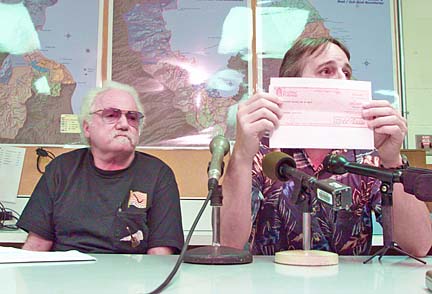
Internet scam victim Anthony Schaeffer and acting police Lt. John McCarthy met with the media yesterday at the Kailua Police Station to warn the public of the dangers of doing business over the Internet. McCarthy was holding a $4,000 counterfeit cashier's check, which Schaeffer's bank verified as legitimate before the scam was revealed.
Nigerian Internet scam
takes new form
A Kailua man lost $2,544 this month in the latest twist on the Nigerian Internet scam, police said yesterday.
"I'm pretty embarrassed," said 65-year-old Anthony Schaeffer. "You'd think I would be smart enough.
"I just don't want to see anybody get burned like me."
Schaeffer is one of eight Windward residents who have been defrauded of a total of $10,000 in the last two weeks, according to Kailua police.
Police said it was a takeoff of the Nigerian scam, where letters, e-mails or telephone calls supposedly originating from Nigeria asked people to make their bank accounts available so wealthy foreign investors could hide money in their U.S. accounts. Instead, the scammers stripped those accounts of money.
Schaeffer, who advertised ukuleles on an Internet site, said a woman claiming to be from Nigeria ordered four ukuleles for $3,600.
The woman, who used the name Toye Benson, sent a $4,000 cashier's check to include shipping costs but later changed the order to two ukuleles for $1,450.
She gave specific instructions to wire the balance to her.
Schaeffer got suspicious because the check appeared to be drawn from a Florida bank, not from Nigeria. "I kind of had a little bit of doubt in my mind," he said.
He took the authentic-looking cashier's check to his bank the first week of July and had the teller scan the check three times to see if it was counterfeit. Schaeffer said she told him it was OK.
He deposited the check into his account, went to Western Union and wired $2,400.15 to Benson. He also paid $144 for the service.
But the check bounced.
"I don't know what a counterfeit cashier's check looks like," he said. "Evidently the bank doesn't know, either."
Police said many victims are embarrassed to come forward. They hope Schaeffer's example will discourage people from falling for such scams.
Police said the best way to stop these scam artists is to prevent the scams from happening in the first place.
"You can't track them," said acting Lt. John McCarthy. He said police get similar cases regularly, but most go unreported: "It's virtually un-investigatable."
McCarthy said once the suspects get a money code for the wire transfer, they can pick up the money from anywhere in the world. One suspect picked up several Moneygrams from different cities in different states.
